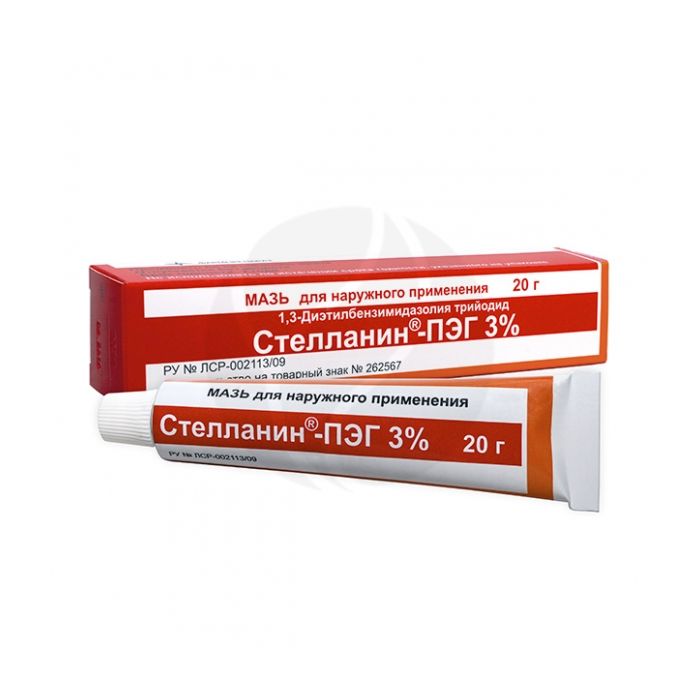Stellanin - PEG ointment 3%, 20 g
Russian Pharmacy name:
Стелланин - ПЭГ мазь 3%, 20 г
Treatment of acute purulent processes (wounds) of the skin and soft tissues (boils, carbuncles, hydroadenitis, phlegmon, abscesses).
Additional treatment of purulent complications of postoperative wounds (after excision, coagulation, episiotomy, for the treatment of skin cracks, wounds and stitches).
Thermal lesions of the skin and soft tissues of I-III degrees, complicated by the infectious process.
Trophic ulcers, bedsores, complicated by an infectious process.
Abrasions, cuts, scrapes, cracks, scratches.
The ointment is applied in a thin layer of about 1.5-2 mm directly to the wound surface, after which a sterile gauze bandage is applied or the drug is applied to the dressing material, and then to the wound. The ointment layer should exceed the circumference of the wound by at least 5 mm. The tampons soaked in ointment loosely fill the cavities of purulent wounds after their surgical treatment, and gauze turundas with the drug are injected into the fistulous passages. When the wound is localized at an inconvenient place for bandaging, it is permissible to use an adhesive plaster or adhesive bandage. Dressings are changed 1-2 times a day.
The daily dose should not exceed 10 g. The duration of treatment is on average 5-15 days.
For minor skin lesions (abrasions, cuts, scratches, cracks, scratches), the drug is applied in a thin layer to the affected surface twice a day.
Active substance:
1,3-Diethylbenzimidazolium triiodide - 3.0 g
Excipients:
Povidone K-17 - 2.0 g
(Low molecular weight polyvinylpyrrolidone)
Dimethyl sulfoxide (Dimexide) - 5.0 g
Macrogol 1500 - 25.0 g
(Polyethylene oxide 1500, Polyethylene glycol 1500)
Macrogol 400 - 65.0 g
(Polyethylene Oxide 400, Polyethylene Glycol 400)
Hypersensitivity to the components of the drug, thyrotoxicosis, thyroid adenoma, severe renal failure, simultaneous therapy with radioactive iodine, children under 18 years of age, I trimester of pregnancy.
With care :
Chronic renal failure, II and III trimesters of pregnancy, lactation.
Dosage form
Ointment for external use.
Composition per 100 g of ointment:
Active substance:
1,3-Diethylbenzimidazolium triiodide - 3.0 g
Excipients:
Povidone K-17 - 2.0 g
(Low molecular weight polyvinylpyrrolidone)
Dimethyl sulfoxide (Dimexide) - 5.0 g
Macrogol 1500 - 25.0 g
(Polyethylene oxide 1500, Polyethylene glycol 1500)
Macrogol 400 - 65.0 g
(Polyethylene Oxide 400, Polyethylene Glycol 400)
Description of the dosage form
The ointment is dark brown in color with a weak characteristic odor.
Pharmacological group
Antiseptic.
Pharmacodynamics
The mechanism of the pharmacological activity of the drug is the antibacterial action of 1,3-diethylbenzimidazolium. Active iodine, which is a part of 1,3-diethylbenzimidazolium triiodide, inactivates the proteins of the bacterial wall and enzyme proteins of bacteria, thereby exerting a bactericidal effect on microorganisms. The pronounced antimicrobial effect of the drug prevents wound infection.
Along with antibacterial and anti-inflammatory effects, the ointment has a high osmotic potential, which is especially important in the treatment of purulent wounds, because promotes the evacuation of purulent discharge from the wound defect.
Pharmacokinetics
Systemic absorption of the active substance is absent even with damaged skin, however, therapeutic concentrations of the drug are present in the wound.
Indications
Treatment of acute purulent processes (wounds) of the skin and soft tissues (boils, carbuncles, hydroadenitis, phlegmon, abscesses).
Additional treatment of purulent complications of postoperative wounds (after excision, coagulation, episiotomy, for the treatment of skin cracks, wounds and stitches).
Thermal lesions of the skin and soft tissues of I-III degrees, complicated by the infectious process.
Trophic ulcers, bedsores, complicated by an infectious process.
Abrasions, cuts, scrapes, cracks, scratches.
Contraindications
Hypersensitivity to the components of the drug, thyrotoxicosis, thyroid adenoma, severe renal failure, simultaneous therapy with radioactive iodine, children under 18 years of age, I trimester of pregnancy.
With care :
Chronic renal failure, II and III trimesters of pregnancy, lactation.
Method of administration and dosage
The ointment is applied in a thin layer of about 1.5-2 mm directly to the wound surface, after which a sterile gauze bandage is applied or the drug is applied to the dressing material, and then to the wound. The ointment layer should exceed the circumference of the wound by at least 5 mm. The tampons soaked in ointment loosely fill the cavities of purulent wounds after their surgical treatment, and gauze turundas with the drug are injected into the fistulous passages. When the wound is localized at an inconvenient place for bandaging, it is permissible to use an adhesive plaster or adhesive bandage. Dressings are changed 1-2 times a day.
The daily dose should not exceed 10 g. The duration of treatment is on average 5-15 days.
For minor skin lesions (abrasions, cuts, scratches, cracks, scratches), the drug is applied in a thin layer to the affected surface twice a day.
Side effects
In rare cases, allergic skin reactions (itching, flushing of the skin) are possible, in the event of which the drug should be discontinued.
Overdose
Overdose cases are not described. In case of accidental ingestion of the drug inside, nausea and vomiting may occur. It is necessary to flush the stomach and consult a doctor, if necessary, symptomatic treatment is carried out.
Interaction
The drug should not be used in combination with other antiseptic agents containing mercury, oxidants, alkalis and cationic surfactants. An alkaline or acidic environment, the presence of fat, pus, blood weaken the antiseptic activity.
special instructions
Avoid getting the ointment in the eyes. In case of contact with the eyes, rinse with warm water.
Release form
Ointment for external use 3%. 20 g in aluminum tubes together with instructions for use in cardboard packs.
Storage conditions
In a dry, dark place at a temperature of 0-25 ? C.
Keep out of the reach of children.
Shelf life
2 years.
Do not use after the expiration date printed on the package.
Conditions of dispensing from pharmacies
Without recipe.

